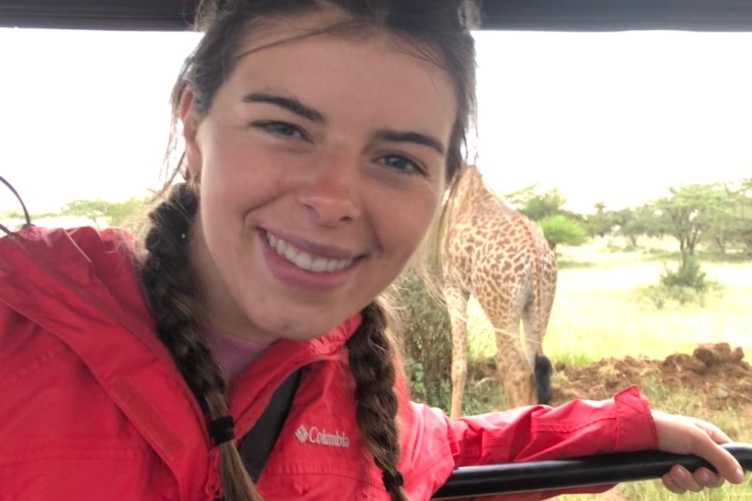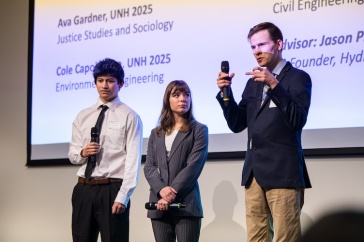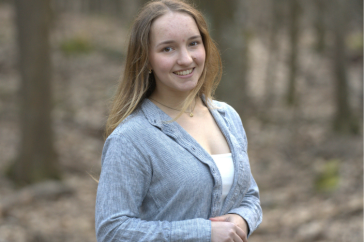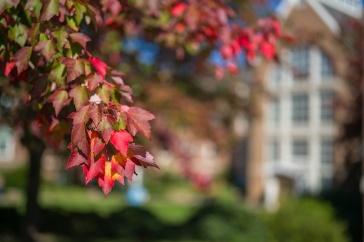
Daisy Burns studies animals in their own habitat while abroad in Tanzania. (Courtesy Photo)
Daisy Burns has developed a love for learning outside the classroom.
As an economics major with an option in public policy and sustainability at the UNH Peter T. Paul College of Business and Economics and a sustainability dual major, Burns has taken advantage of many field experiences provided through The Changemaker Collaborative.
Recently, Burns '24 took her field experience to new heights, spending the first half of 2023 immersed in the wilds of Tanzania and the rainforests of Costa Rica.
Her journey began with a semester abroad in Tanzania with the School of Field Studies. Upon its conclusion, she extended her stay in Tanzania, courtesy of a $10,000 UNH International Changemaker Grant. This allowed her to collaborate with the Outreach Program, a nonprofit corporation, to provide safe water, food, medical care and education in Nkungi, Tanzania. Following that experience, Burns rejoined the School for Field Studies for a one-month term in Costa Rica.
“The entire experience was a reminder about how much there is out there on a global scale to learn,” Burns says. “I’ve learned a lot about sustainability and conservation from my courses, but it’s difficult to have a big-picture understanding of something from such a distance. But, when you visit another country and learn about a specific community, you start seeing things differently.”
In Tanzania, Burns had the opportunity to study wildlife management and took courses in wildlife ecology, directed research, environmental policy and Swahili language and culture. She said this paired well with her sustainability/environmental conservation interests.
Tanzania has a diverse amount of wildlife including lions, elephants, leopards, buffalo and rhinos. Burns had the opportunity to observe many of these animals’ grazing habits in their natural habitats.
“It was such a surreal and incredible experience, especially doing it with wildlife management and ecology professors because they were able to give us much more background information than we would’ve had otherwise,” says Burns.
Burns and her classmates also got to travel over the border to Kenya for two weeks, where they learned about the differences in conservation policy between Kenya and Tanzania.
The final part of the semester involved a large research project. Collaborating with fellow students from Harvard, Virginia Tech and the University of Wisconsin-Madison, Burns investigated the impacts of climate change on two Indigenous tribes in the Lake Eyasi Basin.
 Their efforts encompassed conducting more than 70 interviews and four community focus groups with Hadzabe and Datoga tribe members to collect data on their perceptions of climate change and their adaptations. The team produced a final research paper with multiple recommendations on how to start addressing climate change.
Their efforts encompassed conducting more than 70 interviews and four community focus groups with Hadzabe and Datoga tribe members to collect data on their perceptions of climate change and their adaptations. The team produced a final research paper with multiple recommendations on how to start addressing climate change.
“It was a great group. The research was something that we were all very passionate about and it made it incredibly easy to work together,” she says. “I think the biggest shock about the research was how normal it was just to show up at someone’s house to conduct the surveys and how welcoming they were to us, complete strangers.”
Burns’ summer experience in Costa Rica focused on environmental justice, water access and management and tourism’s impact on biodiversity.
“We talked a lot about biodiversity. Costa Rica has a significant percentage of the world’s biodiversity, so conservation is especially important there,” Burns says. “We had the opportunity to learn about the country’s many unique ecosystems. Specifically, we learned about the different impacts of climate change on these ecosystems and how threatening that is for the country – and world’s – biodiversity.”
Burns' interest in sustainability and conservation has grown over the years, and it was this passion that drew her to UNH and Paul College in the first place. Burns was a Changemaker Fellow in her freshmen year and entered the Social Venture Innovation Challenge with her nutrient reclamation start-up.
Burns says majoring in economics has helped her understand the global context for many of the conservation and climate change issues that were discussed in Tanzania and Costa Rica. In addition, economics also provides her with a broader picture of social and environmental issues and the different ways those issues can be addressed.
While Burns is still contemplating her career options, her recent experiences have her leaning toward a career that involves environmental conservation, sustainable development and plenty of field experience.
“I think UNH has definitely solidified what it means to have a career in sustainability; that sustainability is intertwined with any industry and should be factored in at all levels of decision making,” she says.
-
Written By:
Aaron Sanborn | Peter T. Paul College of Business and Economics | aaron.sanborn@unh.edu



















































